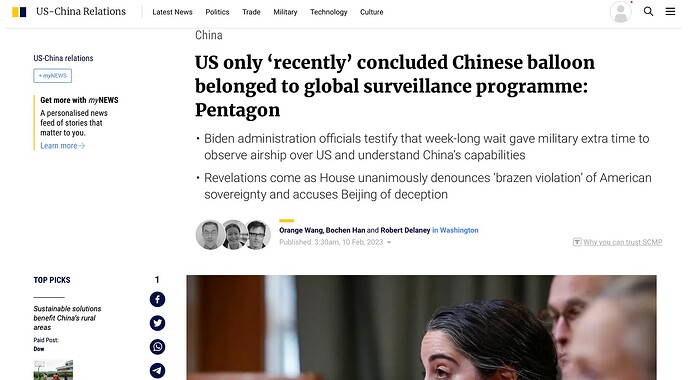-
美国军方官员最近证实,上周探测到的中国气球属于一个全球监视项目,导致击落该气球的时间推迟。
-
一位国务院官员表示,美国U-2间谍飞机收集的图像显示,该气球携带有一系列监视设备。
-
众议院通过一项决议,指责中国 "公然侵犯 "美国主权,并呼吁拜登政府向国会通报这一事件。
-
五角大楼高级官员杰迪迪亚-罗亚表示,美国军方 “近几个月比我们过去更了解这个气球计划”。
-
击落气球的等待使军方得以观察它并了解中国的能力和技术。
-
热气球在水面上被击落,以尽量减少对平民的伤害风险,并改善回收碎片的前景。
-
五角大楼认为它知道中国试图用气球收集什么,但这些信息没有得到证实。
-
众议院决议要求提供有关中国过去在全球使用监视气球事件的信息,所有已知的渗透美国领空的事件,最近的气球事件的时间表,对中国能够收集的数据的评估,以及美国军方对拜登政府的建议的说明。
-
立法者的质询反映了华盛顿迫切需要确定应对中国威胁的战略。
-
参议院就战略竞争时代的美中政策举行了单独的听证会,负责印度-太平洋安全事务的助理国防部长埃利-拉特纳称北京拒绝接听五角大楼关于气球的电话 “真的很危险”。
-
联邦调查局已经从气球上找到了 “非常有限的物证”,并且还没有评估其能力。
-
美国官员认为,该气球和它所连接的监视计划是由中国人民解放军指挥的。
-
US military officials recently confirmed that the Chinese balloon detected last week belonged to a global surveillance program, leading to a delay in shooting it down.
-
A State Department official stated that imagery collected by American U-2 spy planes showed that the balloon carried an array of surveillance equipment.
-
The House of Representatives passed a resolution blaming China for a “brazen violation” of American sovereignty and calling for the Biden administration to keep Congress informed about the incident.
-
The senior Pentagon official Jedidiah Royal stated that the US military was “more aware of this balloon program in recent months than we have been in the past.”
-
The wait in shooting down the balloon allowed the military to observe it and understand China’s capabilities and tradecraft.
-
The balloon was shot down over water to minimize risk of harm to civilians and to improve prospects of recovering debris.
-
The Pentagon believes it knows what China was trying to collect with the balloon, but the information is not confirmed.
-
The House resolution calls for information on past incidents of China’s global use of surveillance balloons, all known infiltrations of US airspace, a timeline of the recent balloon incident, an assessment of the data China was able to collect, and a description of the US military’s recommendations to the Biden administration.
-
The grilling by lawmakers reflects the urgency in Washington to firm up a strategy to counter threats from China.
-
A separate Senate hearing on US-China policy in the era of strategic competition was held, with Ely Ratner, Assistant Secretary of Defense for Indo-Pacific security affairs, calling Beijing’s refusal to take a call from the Pentagon about the balloon “really dangerous.”
-
The FBI has recovered “very limited physical evidence” from the balloon and has yet to assess its capabilities.
-
American officials believe that the balloon and the surveillance program it is connected to is directed by China’s People’s Liberation Army.
